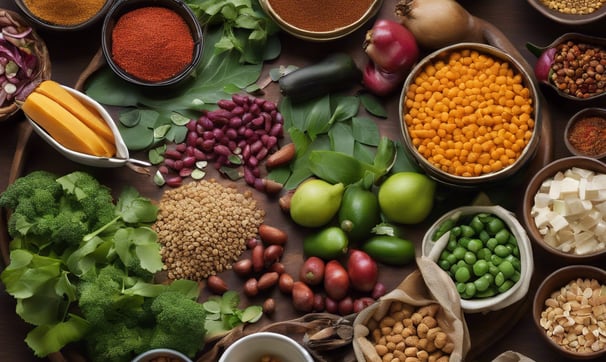Food and Nutritional Security at Crossroads for South Asian Diabetes Patients
In South Asia, managing chronic diseases like diabetes hinges on ensuring food and nutritional security. This issue is particularly pressing in India, Pakistan, and Bangladesh, which collectively have over 125 million adults with diabetes. Widespread food insecurity exacerbates the situation, and socio-economic factors and cultural practices significantly impact the ability of diabetes patients to secure adequate nutrition. Further complicating matters are urbanization, dietary changes, and socio-economic disparities.
SPOTLIGHT


In South Asia, managing chronic diseases like diabetes hinges on ensuring food and nutritional security. This issue is particularly pressing in India, Pakistan, and Bangladesh, which collectively have over 125 million adults with diabetes. Widespread food insecurity exacerbates the situation, and socio-economic factors and cultural practices significantly impact the ability of diabetes patients to secure adequate nutrition. Further complicating matters are urbanization, dietary changes, and socio-economic disparities.
Despite the critical importance of this issue, research on the intersection of food insecurity and diabetes management in South Asia remains limited. Existing studies tend to focus more on diabetes prevalence and risk factors, giving less attention to the socio-economic determinants of food insecurity and effective interventions. Diabetes, characterized by high blood glucose levels due to insulin issues, is increasingly common in low- and middle-income countries. It includes:
Type 1 diabetes: An autoimmune condition requiring lifelong insulin.
Type 2 diabetes: Often related to lifestyle, managed through lifestyle changes and medication.
Gestational diabetes: Occurs during pregnancy.
South Asians are particularly susceptible to diabetes, with rapid increases due to urbanization, sedentary lifestyles, and dietary changes. Addressing diabetes in this region requires a thorough understanding of the disease's epidemiology, risk factors, and health impacts.
Socio-economics factors such as poverty, low education, unemployment, and limited healthcare access significantly contribute to food insecurity among diabetes patients in South Asia. Cultural and societal norms also play a crucial role, influencing meal patterns and gender roles. For effective diabetes management, controlling carbohydrate intake, managing portion sizes, and adhering to dietary guidelines are essential. However, challenges such as restricted access to nutritious foods and cultural barriers make this difficult.
Initiatives in India, Pakistan, and Bangladesh aimed at improving food security and nutrition among diabetes patients include community nutrition education programs, food assistance schemes, and healthcare interventions with nutrition counseling. The effectiveness and scalability of these programs vary across contexts.
Community Nutrition Education Programs
These programs aim to educate communities about proper nutrition and its role in managing diabetes. They focus on the importance of a balanced diet, portion control, and the benefits of nutrient-rich foods. However, cultural barriers and misconceptions about diet often hinder the effectiveness of these programs.
Food Assistance Schemes
Food assistance schemes provide direct support to those in need, ensuring access to nutritious foods. These programs have shown positive outcomes in some areas, but their reach and consistency are often limited. The challenge lies in scaling these programs to cover larger populations effectively.
Healthcare Interventions with Nutrition Counseling
Integrating nutrition counseling into healthcare interventions has proven beneficial for diabetes management. Patients receive personalized dietary advice and support, which helps them make better food choices. However, limited healthcare access and resources in many areas restrict the widespread implementation of such programs.
The literature underscores the multifaceted relationship between diabetes management, food insecurity, and nutritional status in South Asia. Effective diabetes management relies on carbohydrate control and a balanced diet rich in whole grains, fruits, vegetables, lean proteins, and healthy fats. However, challenges such as limited access to nutritious foods, dietary misconceptions, and cultural barriers impact dietary management.
Despite progress, further research and a comprehensive approach are required to address existing gaps and enhance the quality of life for diabetes patients in India, Pakistan, and Bangladesh. By understanding and addressing the socio-economic determinants of food insecurity, these nations can make significant strides in managing diabetes effectively and ensuring better health outcomes for their populations.
Future research should focus on evaluating the effectiveness of current interventions, exploring socio-economic determinants, and addressing cultural barriers to diabetes management. A multidimensional approach is necessary to address gaps and enhance the lives of diabetes patients in the region.
Evaluating Intervention Effectiveness
Research should systematically evaluate the outcomes of various interventions to identify the most effective strategies for improving food security and diabetes management. This includes assessing the impact of community nutrition education, food assistance schemes, and healthcare interventions.
Exploring Socio-Economic Determinants
Understanding the socio-economic factors that contribute to food insecurity is crucial for developing targeted interventions. Research should explore how poverty, education, employment, and healthcare access affect the nutritional status of diabetes patients.
Addressing Cultural Barriers
Cultural norms and dietary practices play a significant role in food security and diabetes management. Future research should investigate ways to overcome cultural barriers and misconceptions about diet and nutrition. This includes developing culturally appropriate education programs and interventions.
The path forward involves multi-sectoral approaches that integrate healthcare, nutrition education, and social support. Policymakers, healthcare providers, and community organizations must work together to develop and implement strategies that address the unique challenges faced by diabetes patients in South Asia. By prioritizing food and nutritional security, these efforts can help mitigate the impact of diabetes and improve the overall well-being of millions of people in the region.
Please note that the views expressed in this article are of the author and do not necessarily reflect the views or policies of any organization.
Muhammad Abdullah Nisar is MSc (Hons) Scholar at the Institute of Agricultural and Resource Economics, University of Agriculture, Faisalabad, Pakistan
